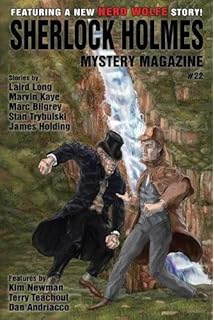"Red Jacks Wild," by Kim Newman, in Sherlock Holmes Mystery Magazine, Issue 17, 2015.
You could argue that this is not the best mystery story I read this week. At approximately ten thousand words it's more like a novella. And you could say it's fantasy/horror rather than mystery.
Don't care.
In any case, it's in a mystery magazine, and a series of murders are solved, and if you don't like that you can start your own review blog. So
there.
I try not to reveal the plot but there is a lot of premise here to explain before we get to the plot.
The narrator is John Carmody, a psychologist in New York in 1951. He also happens to be Jack the Ripper.
Wait a minute, you say. He'd have to be a hundred years old.
Well, he is. But he looks the same age he did in the 1880s when he started making human sacrifices to Hecate. Which he still does, every three years.
But not prostitutes every time. He alters his "disposables-" And now we come to the first thing I love about this story.
You may be familiar with the theory that popular horror movies are the ones that capture the zeitgeist - I might say the frightgeist - the main thing that people of the time are scared of. So right after World War II we had Godzilla and other monsters created by nuclear radiation. At the height of the Cold War we had
Invasion of the Body Snatchers in which your best friend or neighbor might turn out to be the enemy! When AIDS made blood a scary thing Dracula made a big comeback. I lieave it up to you to decide what the current popularity of brain-seeking zombies means.
My point is that this Jack the Ripper understands the concept.
In New Orleans in 1909 I tok colored children. They called me the Voo-Doo Man. The cops didn't listen to the parents until I was done. In California in 1933, as the Hobo Hacker, I picked on jobless transients. Last time, the Red Knife, preyed on card-carrying communists...
Carmody picks the people we don't care about. And, as the FBI's favorite shrink, he gets to steer them to the wrong killers. But now someone is slaughtering juvenile delinquents - surely a classic "disposable" in America of the 1950s - and it isn't him.
It seems to have something to do with his most famous patient, a publisher of horror comics, who is being tormented by another psychoanalyst, who blames the comics for all the nations ills. Yes, this story is all about America's twisted psyche, and I loved it.




